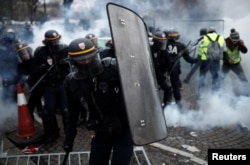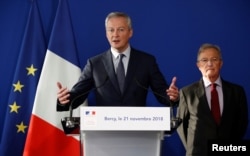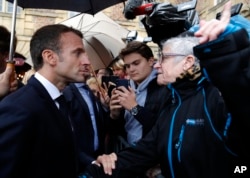French President Emmanuel Macron, caught off guard by violent demonstrations against diesel tax hikes, warned his cabinet on Monday that the protests could tarnish France's image and said the government needed to listen to voter anger.
The 10 days of unrest, which on Saturday left some Parisian boulevards transformed into battlefields, hit Macron as he sought to counter a sharp decline in popularity, and have again exposed him to charges of being out of touch with voters.
He has shown no sign, however, of reversing the diesel tax hikes, which he says are needed to help spur a switch to greener energy, though he is now indicating a willingness to soften the blow for motorists on modest incomes.
Police on Saturday fired tear gas, water cannon and rubber bullets at thousands of protesters who trashed restaurants and shop-fronts and set wheelie bins ablaze on Paris' upmarket Champs-Elysees boulevard, a tourist magnet.
"We shouldn't underestimate the impact of these images of the Champs-Elysees [...] with battle scenes that were broadcast by the media in France and abroad," government spokesman Benjamin Griveaux said.
After meeting with business associations, Finance Minister Bruno Le Maire said the protests would have a "severe impact" on the economy, though it was too soon to say what the effect on fourth-quarter growth would be.
Now in their second week, the "yellow vest" protests have blocked roads across the country, impeding access to fuel depots, out-of-town shopping malls and factories.
"Behind this anger there is obviously something deeper that we must respond to, because this anger, these anxieties have existed for a long time," Griveaux said.
Protesters will be looking for concrete answers from Macron when he unveils a new longterm energy strategy on Tuesday.
Green credentials
Macron has stepped up his defense of the diesel tax, aware that the French treasury is hungry for the revenues the levy generates and that unwinding the tax would damage his green credentials.
He has earmarked 500 million euros to help poorer citizens buy less-polluting vehicles, seeking to answer criticism that his reforms have eaten into household spending.
The weekend's violence also exposed tensions within the amorphous "yellow vests" movement, so-called because the protesters don the high-vis jackets which all motorists in France must carry in their vehicles.
They strove to maintain a united front on Monday, forming a committee tasked with securing a meeting with the president and Griveaux said that would happen if they came forward with concrete proposals.








